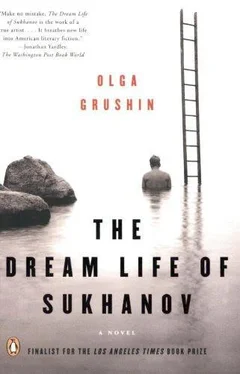Passing along winding corridors whose parquet floors were slippery with many layers of polish, he imagined a barely perceptible musical rhythm pulsating like a prolonged moan behind the door to Ksenya’s room, and a moment later caught a snippet of a telephone conversation, Vasily’s indignant voice saying to an invisible someone, “I don’t understand how he could…” and then fading away, muffled by darkened distances. When he entered the bedroom, he found Nina already in bed, propped up against a pillow with a thick book, her pale face gleaming with the silvery pollen of some precious night cream.
“What are you reading, my love?” he asked, feeling oddly like someone seeking reconciliation after a quarrel.
“Van Gogh’s letters to his brother,” she replied without looking up.
“Maybe you should try some clever detective story instead,” he offered with a tentative smile. “I could recommend one or two.”
But she said nothing, and with an inexplicable sinking of spirits, he wormed his way under the blanket on his side of their enormous bed. For a few minutes he leafed through a novel he had picked up from his nightstand, but the words meant nothing, all the characters seemed to have the same name, and he could not find the place where he had stopped previously. Giving up, he lay back in the crispy stillness of the sheets, lit on one side by Nina’s pink lampshade, and listened to a car honking a few streets away, a dog barking listlessly in the courtyard, his wife turning the pages of her book…
“The light bothers me,” he said finally.
She nodded, placed her velvet bookmark between the pages, clicked off the lamp, and slid into the darkness, her back toward him. He remained still, waiting for her breathing to acquire the nebulous weightlessness of dreams; but time passed, and he sensed that she was still awake.
“An amazing thing happened to me today,” he whispered. “I remembered something wonderful from my childhood. May I tell you?”
But there was no answer; she must have been asleep after all. For a long while he struggled with the night in a vain attempt to follow her, employing every trick he knew—studying his measured heartbeats, counting backward, drawing complicated figures behind his closed eyelids, picturing a trotting line of sheep, camels, elephants juggling multicolored balls with their trunks—yet sleep continued to elude him. After an hour of torture, his head swimming with garlands of figures and caravans of beasts, he climbed out of bed and, his feet somehow condensing into slippers, walked back to the study to do more work.
A yellow rectangle of light from a streetlamp on the corner of Belinsky Street sliced through the window and fell directly onto Belkin’s painting, making it glow in the obscurity of the room with a strange, almost three-dimensional intensity. Casting an involuntary glance on it, he noticed with surprise that Leda no longer had her flowing black tresses: a blonde now sat by the lake, her short hair resting in a perfectly curled wave on the elongated nape of her neck. At the sound of his footsteps, she turned, and with a painful start he recognized Nina—Nina enveloped by the sweet, sinful aromas of the lilies, lulled by the lazy lapping of the waters, her fifty-two-year-old body still glorious, still gleaming—a perfect middle-aged Leda awaiting her feathered god.
She looked at him without recognition and then indifferently moved her eyes away, to an unseen horizon on which the white question mark of the swan’s neck was about to materialize in a few casual brushstrokes. Frozen in the middle of the room, he felt helpless and suddenly aged in his old-man polka-dot pajamas, dreading the inevitable divine seduction yet unable to turn away—but something else happened as he watched. A ripple ran through Nina’s flesh, and it paled to a shade lighter than moonlight: her back was sprouting a pair of beautiful swan wings. In a dazzling flash of whiteness, she rose to her feet—and as she did so, he heard a rustle at the window behind him. He swung around and felt terribly disoriented for one dizzying moment. Then, at once, he understood.
The painting on the wall was not a painting at all, but a simple mirror whose frame neatly contained the reflection of the window; and there, only a few steps away, standing on the windowsill, was the real Nina, winged and naked, cautiously trying the temperature of the sky with her big toe, that little gesture of hers he knew so well (she disliked cold water). With a startled cry, he rushed toward her, to prevent, to stop, to catch… He was too late. Already, with that maddening fluid grace she possessed, she glided into the black translucence of the night, leaving behind a solitary feather fluttering slowly to the floor—and although he wanted to shout, to protest, to implore, no words came to him, none at all, and silently, knowing she would never return, he watched as she flew farther and farther away, melting amidst the cold stars above the fairy-tale city of Moscow….
When she was gone, he collapsed into his chair in despair. The rearing Pegasus underneath the lampshade regarded him with sympathy out of the corner of its bronze eye and then, unexpectedly, tore its mouth wide open and neighed, loudly, violently, in an operatic bass, “Damnation, damnation to her!” Embarrassed, Sukhanov mumbled, “Well, I wouldn’t put it quite like that,” and began to fumble with the lamp switch, trying to make it stop. But the sound would not cease—and he saw that their bedroom was once again lit with a pink glow, Nina’s side of the bed was empty, the balcony door stood ajar, and from somewhere outside there flowed into the room a powerful voice singing, “Damnation, damnation to her for all of eternity!”
Unhappily Sukhanov scrambled out of bed. His slippers were nowhere to be found, and cursing inaudibly, he walked out onto the balcony barefoot. Nina was leaning over the railings. The predawn breeze swelled her apricot-colored nightgown, filling it with gentle brightness, so that she appeared trapped in a glowing cocoon of orange air. She barely glanced at him, but he saw that she looked worried.
The operatic chant clearly issued from the apartment directly below.
“What the hell is this? Who’s making all that noise?” he asked in a whisper.
“Ivan Svechkin,” Nina whispered back. “You know, the composer who lives downstairs. He writes children’s songs. ‘That Happy Day in April When Our Ilyich Was Born’ is one of his.”
“Well, this sounds like a church chant,” he said with irritation. “I suppose he has a good reason for treating his neighbors to a nice bit of liturgy in the middle of the night?”
There were signs of sleepy stirrings on all four sides of the courtyard—windows lit, shadows peering from behind curtains, balcony doors slamming.
“I’ve heard he has a very unhappy marriage,” said Nina quietly. “His wife is twenty years younger, and he gets jealous, can’t stand to have her out of his sight…. He must be having some kind of nervous breakdown.”
They fell into an uneasy silence, listening. The rhythmical liturgy went on and on: “Damnation, damnation to her, damnation to her for all of eternity!” And as the minutes passed, it began to seem to Sukhanov that their warily expectant courtyard was being gradually transformed into the interior of a great, roofless, solemn church. The Big Dipper swung like an incense holder, spraying drops of stars into the skies above; gilded squares of lit windows all around them turned into jeweled icons, encircled by candle flames, glimmering with blackened lacquer on ancient stone walls—and for an instant he even imagined that the spirit of some fallen angel was truly being cast out by communal condemnation into the chilly August nothingness….
Читать дальше








![Theresa Cheung - The Dream Dictionary from A to Z [Revised edition] - The Ultimate A–Z to Interpret the Secrets of Your Dreams](/books/692092/theresa-cheung-the-dream-dictionary-from-a-to-z-r-thumb.webp)



